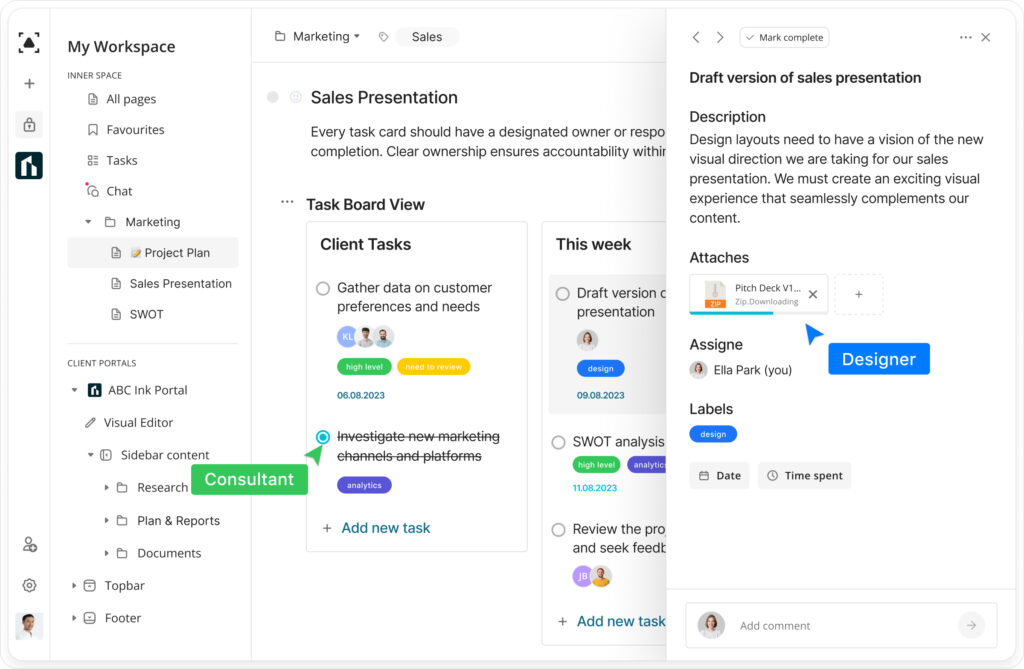
What Is Team Knowledge and Why Should Your Employees Share It?
- November 15, 2023
- 12 Min read
Your employees’ knowledge about the project is the most valuable information capital. However, if all expertise is in people’s heads, this does not help your company move forward. Think about what happens if someone with all the knowledge about a vital task quits one day. It will cause complete chaos in any team.
For this reason, important information should be available to the entire team, not just a few people. After all, no matter how much we would like to transmit our ideas with the power of thought, this is not yet possible.
According to Statista, in January 2022, 45% of respondents worked remotely. Despite all the advantages of remote work, it is more difficult for team members who work from home to keep abreast of all the changes, news and innovations in the company. Thus, team knowledge management is critical to running a successful business, especially if your company is growing.
In this article, we’ll look at what team knowledge is, why it’s essential and how to manage team knowledge.
What Does the Term “Team Knowledge” Mean?
Surely each of our readers has a rough idea of what team knowledge is, but let’s give a more precise definition.
Team knowledge is the knowledge that a group of employees (a team) has collected, their ideas and conclusions and a common understanding of situations and solutions found. This can all be stored in a knowledge base or in some other way.
For example, think about your marketing team and their collective knowledge. The marketing team tends to work on similar or related tasks and share ideas together. They jointly consider emerging problems and look for solutions sharing their previous experience – that is, team knowledge.
Thus, team knowledge is operational information that is generated and shared by a group of colleagues.
Why is it Important to Share Knowledge Within a Team?

How individual employees understand or perform tasks may seem of little importance. Some managers even think that having shared team knowledge can lead to excessive standardization of processes and a lack of creativity among the team members.
Of course, the presence of various specialists in a team is good just because everyone has their own knowledge, experience and specific tasks that they can perform on their own. However, if you do not provide opportunities for team knowledge sharing, you will not allow employees to communicate more effectively with each other.
Also, think about this: what would you do if an employee leaves the company or moves to another department? Will the rest of the team be able to take on their tasks?
So, here are five reasons why having a team knowledge-sharing policy is important for your business.
More innovation and space for growth
Companies that do not value team knowledge sharing are slower to grow, which is pretty obvious. Conversely, organizations that value a culture of knowledge sharing are more competitive. Team knowledge allows all employees to be on the same page and come up with innovative solutions together.
Reducing costs and improving business process efficiency
If your team members spend hours searching for the right information while you already had a similar case and another employee found a solution, your company is wasting time and money. Duplicating surveys, re-searching for answers to questions already considered before and other similar actions do not work in your company’s favor.
For example, your marketing team has already studied the popularity of your product among Gen Z. However, your development team did not know about this and ordered the same study.
This, of course, led to additional time and financial costs. If team knowledge sharing is considered the norm in the company, such situations would not arise – you would have a single knowledge database that all team members could use. It would also affect the quality and efficiency of decision-making.
Increasing customer focus
Team knowledge sharing helps all employees better understand customers’ needs, problems and requests. For example, if the practice of team knowledge sharing is introduced in your company, the customer service department shares customer feedback with other teams. Marketers, developers and product managers begin to understand their customers better. Team knowledge sharing allows the business to make more customer-centric decisions, and employees are also focused on delivering the best customer experience.
Finding solutions faster
Remember: two heads are better than one. If an employee is stuck looking for a specific solution, a database with team knowledge can greatly help them. Team knowledge sharing enables more efficient collaboration across departments and particular teams. It’s also worth remembering that most employees are now working remotely, which means fewer opportunities to meet other employees and share information.
Painless adaptation to rapidly changing markets
If team members share their knowledge with others, they become more flexible. Thus, the company more easily anticipates changes and adapts to them. One of the key parameters for success is the ability to keep up with the needs of customers and the current market situation.
How to Share Knowledge Within a Team
OK, now that you understand team knowledge sharing is important, how do you put it into practice?
Whether you want to set up processes at the level of one department or the entire company, it all comes down to communication. If you encourage a collaborative culture and use modern communication tools, you will create a safe knowledge-sharing space.
Of course, you will also need detailed documentation – it is important that the knowledge of team members is saved in text form. In this way, remote workers and newcomers can quickly join the general processes and better understand how everything works.
EXPERTS SAY:
“In our marketing team I deal with digital promotion, the rest of the marketers work with offline tools. To ensure that we were on the same page, I developed a special expert analysis to evaluate the effectiveness of advertising campaigns and visualize the results of online promotion for my colleagues. Every month my team and I analyze the results of sales and activities that were implemented online and offline.
My report reflects both the narrow effectiveness indicators of online promotion, and the indicators related to offline promotion, the budget spent, and the results of activities in social networks.
It is important for me to see the result of the work done, to draw conclusions about the effectiveness of certain tools and change the tactics if necessary. My expert report allows me to show the information to my colleagues clearly and understandably. This approach helps me and our marketing team to coordinate our actions and achieve a synergistic cross-functional effect.“

So, here are four steps to building a knowledge-sharing culture within a team.
Make sure you have a culture of communication
The key word in knowledge sharing within a team is “sharing.” If your employees are reluctant to communicate with each other or do not have a common platform for teamwork, you need to eliminate this shortcoming.
Start by providing a platform for communication. Create open channels of communication where every employee can ask a question, have unrestricted access to knowledge sharing, and ensure that team members in different roles have access to cross-functional collaboration.
It should be easy and comfortable for your employees to contact someone from another department to get the information they need and share knowledge. You should also hold general meetings for all teams, video conferences and other events to share experiences and provide the opportunity to ask any questions.
Introduce employees to newcomers and keep informal communication between departments in every possible way. If team members know each other well and do not hesitate to write another message with a question, knowledge sharing will be much easier for them.
Connect knowledge-sharing tools
Having a single platform is essential for high-quality collaboration, primarily if your employees work remotely. Your team needs more than just email, Google Docs and a video conferencing tool.
FuseBase is one of the best collaboration platforms for companies of any size. With FuseBase, you can:
- Create and manage super documents, including all types of tables and databases;
- Create customized workplaces and manage multi-organizations;
- Structure information and give access to members of different workplaces according to your security rules;
- Create Public Pages that allow easy distribution of your knowledge;
- Collaborate effectively with real-time editing, mentions, comments, etc.
Build an efficient team knowledge sharing system with FuseBase
FuseBase is like your digital headquarters, where every employee can find the data they need, collaborate & communicate with other team members and contribute their knowledge.
Provide ongoing training for employees
All your employees should be well acquainted with your company’s basic terms, goals, objectives and products. To achieve this, you need to create a consistent training system so that all employees, including newcomers, are on the same page with the rest of the team.
Of course, you will need resources for this and some planning, but this is a critical step in ensuring a knowledge-sharing culture. Create a training program and make these training sessions non-intrusive but mandatory – for example, two hours a week. Invite experienced employees as speakers to share their knowledge about the project from their side.
It is also crucial to conduct such training consistently and not abandon this idea, even if it does not receive a proper response at first.
By starting from the very beginning, you will eliminate the fears that new team members have when they do not understand the processes in the company or their role in your business. We’ve all experienced the fear of asking a stupid question (one that everyone seems to know the answer to) or saying something too obvious.
Just imagine that your sales team has very little knowledge of what kind of product you are creating and what they are supposed to be selling. To avoid such situations, training should be complete and mandatory for everyone. As soon as your development team introduces a new feature, all other departments need to know what it is and how it works.
Create an easy-to-use knowledge base
Now that all your employees are familiar with the main processes and products in the company and are happy to share problems and solutions with each other, you can collect all this information in a knowledge base. This is a great way to share important information and knowledge with your team or find answers to frequently asked questions. In addition, you may attract contractors and remote employees who cannot attend training due to other time zones. In such cases, the knowledge base may be one of their main information sources.
Unfortunately, in many companies, knowledge bases are created “for show” and are forever lost on the intranet after creation.
To prevent this from happening, you need to create an easy-to-use and well-organized knowledge base that your employees will actually want to use.
One of the main factors for the success of your knowledge base is the simplicity of the interface and navigation in particular. If you need to go deep through a dozen links to find the answer to a question in the knowledge base, consider that your team members will not find the answer and will spend their own and other people’s resources again on duplicating information.
For more convenience, you can use the customization and tagging tools available in modern services such as FuseBase. You can create different sections in your knowledge base for particular teams, for example:
- A knowledge base for the customer service department with the most frequently asked questions from users;
- A folder with documents from the sales department, which will contain examples of how to deal with objections, presentations, case studies, price lists and other documents;
- A knowledge base for marketers with info on the main processes, planned activities, research results and so on.
Gradually, your knowledge base will expand in parallel with the growth and development of your company. It is important not to forget about filling out the database and keeping all documents up to date.
Boost Employee Engagement: Adding to the Knowledge Base
Some employees may think of the knowledge base as something optional and outdated. This will indeed be the case if the information in the database is uninteresting, too formal and cluttered. So, here are the basic rules for creating a knowledge base and encouraging others to contribute:
- Add only really important information to the knowledge base and accept the rules for creating, formatting and editing materials from the very beginning.
- Create a truly convenient all-in-one platform that is accessible to everyone.
- Make it the only place to store all the information employees need, and they will gladly use it.
If your team has a developed culture of communication and helping each other, each team member will understand how important their own contribution is and create their own documents for sharing knowledge with colleagues.
Learn how FuseBase can help you with building up your perfect knowledge base here.
You can also introduce gamification elements to encourage employees to add new documents to the knowledge base.
Enhance Business Results: Team Collaboration & Knowledge-Sharing

Information and practical experiences of employees is a valuable asset for any company. To ensure that the knowledge accumulated by your employees does not disappear and is available to others, introducing a culture of knowledge sharing is critical. To do this, you need a reliable and simple platform where employees can collaborate, discuss work issues and share their experiences.
FuseBase offers powerful yet intuitive tools for team collaboration. Try it for free and streamline all your company’s data management processes!
Find more FuseBase articles and updates on our Facebook page!
Found it useful? Share the article with your community
Subscribe to our blog!
Get weekly tips and insights on how to grow your business